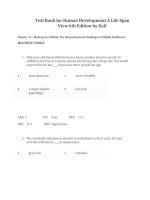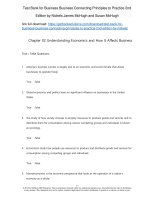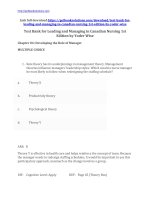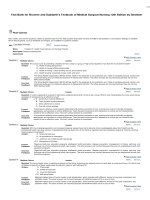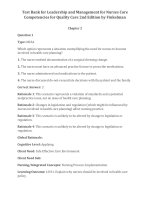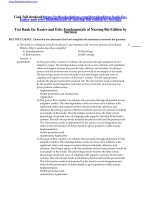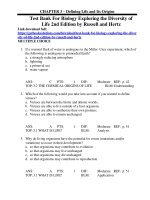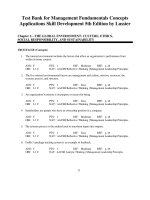Download test bank for ethics and issues in contemporary nursing 2nd edition by burkhardt
Bạn đang xem bản rút gọn của tài liệu. Xem và tải ngay bản đầy đủ của tài liệu tại đây (290.13 KB, 4 trang )
Test Bank for Ethics and Issues in Contemporary Nursing 2nd Edition by
Burkhardt
Chapter 1 – Social, Philosophical, and Other Historical Forces Influencing the
Development of Nursing
MULTIPLE CHOICE
1.
What historical influences affected nursing as a moral discipline?
a. technology
b. society
c. spirituality
d. oppression
ANS: C
2.
BLM: Remember
PTS: 1
REF: p. 5
BLM: Higher Order
REF: p. 6
BLM: Remember
Why do professions exist?
a. to meet the needs of employers
b. to meet the needs of individuals
c. to meet the needs of society
d. to meet the needs of families
ANS: C
4.
REF: p. 3
For which of the following is empathy a motive?
a. meeting the needs of others
b. moral reasoning and action
c. becoming a nurse
d. determining right from wrong
ANS: B
3.
PTS: 1
PTS: 1
Which of the following statements best describes Florence Nightingale?
a. She believed in traditional expectations for women.
b. She was a nurse and increased soldiers’ mortality rates.
c. She believed in nurses restricting their careers.
d. She was a social reformer and statistician.
Copyright © 2014 Nelson Education Ltd.
1-1
Chapter 1 Social, Philosophical, and Other Historical Forces Influencing the Development of Nursing
ANS: D
5.
PTS: 1
REF: p. 5
BLM: Higher Order
PTS: 1
REF: p. 8
BLM: Remember
Why were the Middle Ages significant for nursing?
a. Religions and church-sanctioned secular nursing orders offered the only legitimate
avenue for women wishing to become nurses.
b. There was an upsurge in the respect afforded to nursing and midwifery, and nurses
began to practise autonomously.
c. Healing arts in Denmark and Greece were performed in sacred ceremonies by
priests, priestesses, or shamans.
d. Most nurses were women of high social status.
ANS: A
8.
BLM: Higher Order
What is the term that relates to knowledge gained through observation and experience? a.
empirical
b. Cartesian philosophy
c. values
d. moral thought
ANS: A
7.
REF: p. 23
In which of the following influences do the helping professions find their origin? a.
inhumane actions
b. perceived social needs
c. serving one’s own needs
d. visualizing the suffering of others
ANS: B
6.
PTS: 1
PTS: 1
REF: p. 8–11
BLM: Remember
When was the “Dark Period of Nursing,” when convalescent patients, prostitutes,
prisoners, and drunkards provided hospital nursing care? a. during the Reformation
b. during the Crusades
c. during the Middle Ages
d. during the early Christian era
ANS: A
PTS: 1
Copyright © 2014 Nelson Education Ltd.
REF: p. 12
BLM: Remember
1-2
Chapter 1 Social, Philosophical, and Other Historical Forces Influencing the Development of Nursing
9.
Why is the concept of social need important to the ethical foundations of the nursing
professional?
a. Nurses must determine the health needs of society.
b. Nursing finds its origin, purpose, and meaning within the context of perceived
social need.
c. Theories of sociology are utilized by nursing scholars, many of whom view them as
conceptual frameworks for nursing practice.
d. Social need determines the boundaries of the ethical principles of distributive
justice, beneficence, and non-maleficence.
ANS: B
PTS: 1
REF: p. 5
BLM: Remember
10. Why does the social status of women affect the status of the nursing profession?
a. Nursing has traditionally been a profession of women.
b. Throughout history, nurses have been afforded higher social status.
c. Women of higher social status rarely become nurses.
d. Women are more skilled than men at nurturing others.
ANS: A
PTS: 1
REF: p. 6–7
BLM: Remember
11. What does the term empirical relate to?
a. serving God and thy neighbour
b. knowledge gained through observation and experience
c. healing through religious intervention, touching of religious relics, chanting, and
other methods
d. the enforcement of religious doctrine related to the status of women in society
ANS: B
PTS: 1
REF: p. 8
BLM: Remember
12. Which of the following had the greatest influence on nursing traditions in Canada? a.
Britain
b. Aboriginal persons
c. France
d. Germany
ANS: C
PTS: 1
Copyright © 2014 Nelson Education Ltd.
REF: p. 12
BLM: Higher Order
1-3
Chapter 1 Social, Philosophical, and Other Historical Forces Influencing the Development of Nursing
13. After the First and Second World Wars, the Canadian Red Cross Society and nursing
groups noted an important trend in health care that is still articulated in the Lalonde and
Romanow report. What is that trend?
a. the formation of nursing groups such as the CNA and professional organizations
b. the political and economic action taken to correct the wrongs suffered by the
military
c. the establishment of governments’ social and political responsibility in health care
d. the need for strong, well-established public health programs, health education,
immunization, hygiene, and care of those living in poverty
ANS: D
PTS: 1
REF: p. 14–15
BLM: Higher Order
14. What does the CNA’s vision for the future of nursing embrace?
a. the varied roles that nurses must play in order to provide holistic care to a diverse
and changing population
b. the formation of joint nursing professional organizations in both Canada and the
United States
c. the important role of military and public health nursing
d. the relationship between social need and the evolution of the practice of nursing
ANS: A
PTS: 1
REF: p. 15
BLM: Remember
15. What is the most critical factor that influences nursing practice?
a. the traditional role of healers
b. the role of women in society
c. the religious and spiritual aspects of health care
d. the introduction of male nurses into the profession
ANS: B
PTS: 1
REF: p. 6
BLM: Remember
16. How is Mary Agnes Snively significant to the development of Canadian nursing?
a. She established the mission of Grey Nuns to new settlers.
b. She established the International Council of Nursing.
c. She established the first national organization for nursing.
d. She established certification for nurses to become experts.
ANS: C
PTS: 1
Copyright © 2014 Nelson Education Ltd.
REF: p. 14
BLM: Remember
1-4
